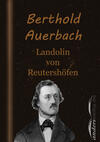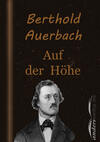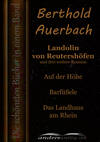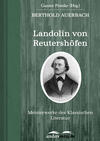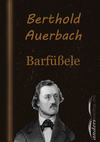Buch lesen: «Villa Eden: The Country-House on the Rhine», Seite 6
CHAPTER XII.
FRAU ADVENTURE
In the morning Eric put on his uniform, for so Clodwig had advised with cautious reference to a former experience. A horse had been placed at his disposal, and his portmanteau was to be sent after him.
Clodwig's contracted brow grew smooth as the handsome, noble-looking young man entered the parlor in his becoming uniform. After greeting him, he pointed to Eric's arm, saying: —
"Take off the crape before you go."
Eric looked at him surprised, and Clodwig explained himself.
"You are not to be sentimental, and you must agree with me that it is not well to enter, for the first time, a stranger's house, wearing a badge of mourning. People often desire a sympathy which they cannot expect to receive. You will be less disturbed in the end, if you impress it upon yourself at first that you are entering service, and moreover are to serve an extremely rich man, who would like to keep everything unpleasant out of sight. The more you keep to yourself your own personal feelings, the more free will you be."
Clodwig smiling quoted from Lucian's "Sale of the Philosophic Sects," where the Stoic as a slave cries out, "Even if I am sold, I am still free within myself!"
Eric good-humoredly took the crape from his sleeve.
Bella had excused herself from appearing at breakfast, and sent Eric a message of farewell till their next meeting.
The two men were now alone. Clodwig gave Eric a letter for Herr Sonnenkamp, but begged him not to make any positive engagement until he had seen him again, adding almost inaudibly, "Perhaps I shall keep you for myself."
As a mother crams all the pockets of her son going away from home, so Clodwig sought to give his young friend all sorts of instructions.
"I have but slight acquaintance with the boy," said he; "I only know that he is very handsome. Do you not agree with me that it is a great mistake to give a young soul the foundation principles which are to determine his life-course, before this young soul has collected the material of life or knows his own tendencies?"
"Certainly," replied Eric; "it is like building railroads in uncultivated or half-civilized countries, before roads have made possible the interchange of agricultural and manufactured products. The root of the disease of modern humanity, as my father often said, lies in the habit of teaching children dogmatically the laws which govern the universe; it is a superfluous labor based on ostentation, which is unfruitful, because it leaps over the first steps."
Clodwig nodded several times. This man might be trusted to sail out into the open sea; he would always have a compass with him.
The time of departure came; Clodwig said, —
"I will go a little way with you."
Eric took his horse by the bridle, and they walked on side by side. The old man often fixed an anxious, affectionate look upon his young friend. He repeated that he considered it a highly honorable task to train the young American for a useful life; then he advised him again to keep this one object in view, and to turn resolutely from all gossip concerning Herr Sonnenkamp, who had certainly left many rumors uncontradicted, either because he was too upright to trouble himself about them, or because he preferred to have some facts of his history hidden by false reports. It was undoubtedly singular, that though he was a German by birth, not a single relative had ever been seen at his house; probably, however, he was of low origin, and helped his relatives on condition that they should have no intercourse with him; Major Grassler had hinted at something of that kind.
"One thing more," said Clodwig, standing still, "say nothing to Herr Sonnenkamp of your having for a short time devoted yourself to the supervision of criminals. I would cast no slur upon him, but many men have an aversion to persons of such a calling."
Eric thanked him, seeing clearly his earnest desire to smooth the path before him. They went on in silence until Clodwig said, "Here I will turn back, and let me give you one warning."
"A warning?"
"Perhaps that isn't the right word; I only want to say to you, make up your mind to pass in the world for an enthusiast. A man who seeks anything in life except profit, pleasure, and honor, appears an enthusiast to many people who have no sympathy with such a predilection; the world cannot be just to such men, it must condemn them, because it sees its own strivings condemned by them. You will have to bear a martyrdom all your life long, if you remain true, – and I believe you will; bear it with a proud self-respect, and remember that a new, old friend understands you, and lives your life with you."
Suddenly the old man laid his hands on Eric's shoulders, kissed him, and walked hastily away, without once turning.
Eric mounted and rode on; as he turned the corner of the wood, he looked back and saw Clodwig standing still. Bella had watched the pair from the balcony, which commanded a view of their whole course; now she went to meet her husband, and was not a little surprised to observe in his face an emotion which she had never seen there before; he seemed to have been weeping.
"You were right," said Clodwig hastily, "it is better for us to remain by ourselves. But I rejoice in this new generation which differs from ours; it wavers no longer between the two poles of enthusiasm and despair; it has, if I may so express it, a sort of intellectual inspiration, and I believe it will bring more to pass than we have. I am glad that I am not too old to understand these young people born into an age of railroads. I admire and love this present age; never before has every man in every calling known so definitely what he wishes and ought to do, both in science and practical life."
Bella thought she must make some, reply, and said that young Sonnenkamp would be fortunate to have such a guide.
"It pains me that he must enter that house."
"Yet you have recommended him."
"Yes, that's it exactly. One is punished sooner or later for undertaking anything with half-sincerity or against his real convictions. I have brought myself into closer relations with this Herr Sonnenkamp, without really wishing it. In his house I always have a feeling as if I were in a family where horse-flesh is eaten. But, good heavens! it may be prejudice, custom; horse-flesh is also one kind of meat. But now I am free from, anxiety for the excellent young man."
Clodwig seemed unable to cease talking of Eric; and as he recalled what had passed, he was astonished at all that he had learned from him in so short a time; pointing to an apple-tree in blossom, he exclaimed: "Look at that tree in bloom, which when shaken covers every one with blossoms, and yet its richness is unimpaired. Such is this Dournay."
Bella replied, that it must be a hard task for a man who was so spoken and thought of to live up to the standard expected of him.
"May not such pleasure in imparting," she asked doubtfully, "be an exaggerated self-esteem or pure vanity?"
"O no! this young man does not wish to make a show; he only wishes that no moment of existence may be utterly wasted. He lets his active spirit work, and he must take satisfaction in the notice and sympathy of others; without this satisfaction, the pleasure of imparting would be impossible. That is the faith which removes mountains of prejudice."
"Faith?" said Bella, smiling beforehand at her own nice distinction, "it seems to me rather like the permanent embalming of a want of faith." He very zealously endeavored to show how this was, rather, the difficult and painful transmission of one's life.
He spoke long and eagerly. Bella appeared to listen, but hardly heard what he said; she smiled to herself at the old diplomatist, who had something incomprehensibly child-like, almost childish, about him. She threw her head back proudly, conscious of her inflexible virtue, which was strongly armed even against her husband, who wished to bring her into constant intercourse with a young man so richly endowed.
In the mean time Eric had ridden on through the wood, filled with fresh animation by the happy chance which had befallen him. He took a firm hold of his horse's bridle, full of that confident spirit to which every undertaking seems sure of success, or, at least, of only short and temporary failure. He congratulated himself on the good fortune that had helped him to win so easily and entirely a man of refined character, who was evidently somewhat cautiously reserved towards most men.
He had left his past life on the mountain behind him, and a new one was beginning. Smiling, he thought, The heroes of old must have felt in my mood, when they knew that they were under the protection of one of the gods of Olympus.
At a turn in the wood he stopped, and, taking Clodwig's unsealed letter from his pocket, read as follows:
"A neighbor's greeting to Herr Sonnenkamp, at Villa Eden.
"Had Fate granted me a son, I should consider it as a completion of the great blessing, to be able to give him this man as a tutor.
"CLODWIG, COUNT VON WOLFSGARTEN. WOLFSGARTEN CASTLE, May 4, 186-."
Eric set spurs to his horse, and rode gaily on through the wood, where birds were singing amid the fresh young leaves. As he passed through the village, he saw at the window of the Rath-haus, behind blooming wall-flowers, a rosy, fair-haired maiden, who drew back quickly as he bowed to her. He would have liked to turn his head to see whether she was looking after him, but he did not venture to do so.
After a little while, it occurred to him that he was very vain to believe that this lingering behind the flowers concerned him at all; Lina had undoubtedly expected to see Baron von Pranken, when she heard his horse approaching.
Eric was now riding along the river-bank in the valley. He was so full of cheerfulness, that songs rose to his lips as they had not done for a long time; he did not give them voice, but sang them in his soul. The whole fulness and variety of thought, perception, and feeling were stirring in his heart. As he saw the sun shining on the glass dome of Villa Eden, it struck him like a lightning flash, —
Why is such a free, delightful existence denied me? why must I labor in the service of others? Then came the thought. But what should I do with such an indolent, selfish life? Then the riddle presented itself, How is one to educate a wealthy boy?
And so strangely are thoughts associated in the human mind that Eric felt, not that he could solve this riddle, but that he could understand how the ancients had represented the idea of enigmatical questioning and the riddle under the form of the Sphinx.
Then again came the inquiry, How can one educate a rich boy, who knows that an estate like that, and untold wealth, are to be his, and who sees no need for exertion in the life before him?
Eric had been looking down; now he threw back his head and smiled as he thought, Neither pupil nor tutor is a mere abstract idea; both are living, variously endowed beings. Such questions can receive no general answer, and all riddles are like stormy weather out of doors, that, seen through the dim atmosphere from the shelter of a house, seems intolerable, but once out in the midst of it, one feels refreshed.
All his puzzling doubts and speculations seemed cleared away, and he felt ready armed to wrestle with the problem. "Come on, riddle, I am ready for you," he said almost aloud, and rode on at a quick trot.
In the midst of his doubts and thoughts a pleasant smile suddenly spread over his face. He wondered whether he were not under some spell, and all the frolicsome humor of youth came over him as he uttered aloud a letter which he would write to his mother.
"DEAR MOTHER:
"You must let yourself be named Frau Adventure, for your son, Doctor Adventure, Captain Hero, in the midst of railway cars and telegraphs, has fallen upon Dream-land, where he is fed upon the sweet-bread of praise, and the sugared almonds of protection, by a pair of spirits who watch over the Holy Grail. He is now seated on a bay horse, and has the magic word sesame of a sage hermit in his pocket, and all things come at his bidding, and each says, 'Heart, what dost thou desire?' Dear mother, if you want a quiet little island, only say so; I have innumerable ones to dispose of.
"And there's a postscript, dear mother. Suppose the millionaire, towards whom I am riding, should be Uncle Adam? That would make the fairy tale complete."
At the thought that this fanciful conjecture might be a probability, Eric stopped short. Then he rode briskly along the broad road, on each side of which grew great nut-trees, dropping their caterpillar-like blossoms on the path. The horse trotted on bravely, his black mane flying in the wind as the rider lifted his cap to let the fresh air cool his hot brow.
BOOK II
CHAPTER I.
A MORNING IN EDEN
The boats sail up and down the river, the railway trains move on this side and on that, and persons from all countries, and in every relation of life, get refreshment from the view.
There thou wouldst like to dwell, many a one thinks, and to pass away thy days in the regular and constant enjoyment of nature, and in voluntary labor, solitary, or in the society of congenial persons.
The banks of the Rhine have the appearance of being charming seats of repose, while they also furnish enough of stirring life. The high-road of intercourse with the world lies before the very threshold of the house; and from the midst of solitude, every hour can unite itself with the great world's varied and bustling activity.
Cheerful towns and villages along the banks, with their castles and vineyards, their beautiful and well-kept country-seats, are everywhere seen, forming an almost unbroken chain.
From town to town, and from house to house, stories are narrated of the narrow escapes of the inhabitants, who saved themselves with resolute strength from the ingulfing flood, or with the last energy of despair reached the shore, many being dashed with violence upon the bank.
He who comes an entire stranger from abroad, and makes his home here, can feel assured that it is at his option to cultivate an acquaintance with the old residents, or to remain by himself. The continual current of strangers, coming and going, allows him who remains to abide in complete isolation.
Whose is that beautiful country-house yonder, which looks to the passer-by, with its tower gleaming from a distance, like a white swan nestling in the green bank? Travellers on the boats passing up and down the river often ask this question, and receive the reply, that the villa is called Eden, and that it is a real Eden, as far as one can judge from the outside, for it is all shut up and guarded, with spring-guns and steel traps the whole length of the garden walls. The servants have permission to show the house and park only when the owner is away on a journey, and then they take in a great deal of money.
One praises the wonderful stables with marble mangers; another, the hot-houses all in bloom; a third, the beautiful arrangement of the interior of the house; a fourth, the fruit-garden and the park, each one according to his own peculiar taste. The owner is a rich American, who has built this house, laid out the shady park, and changed the half-swampy, ragged, and uneven meadow, extending down to the river, into a fruit-garden that bears fruits of a size and beauty never before seen in this region. He was rebuilding, too, the ruined castle there on the height.
And what is the name of this man?
Sonnenkamp. Almost all his servants are foreigners; he visits only a few persons in the vicinity, and seldom receives any one as a guest; no one knows, indeed, who he is, or what he is. He has the finest horses, but he, his wife, and a female companion drive and ride out together, only at some convenient point to turn back again on the public highway.
On the morning that Eric rode to the villa, a large, thick carpet was laid by servants in morning livery on the west side upon the extensive gravelled square. A round table with green damask covering was placed near a many-colored pyramid of fragrant flowers, and on the table was afterwards set a large, ground crystal vase, with artistically arranged flowers and bouquets, and plates for four persons.
A side-table was placed near a blossoming copse of laburnums and variegated lilacs, and on it a large silver tea-urn with lighted lamp. A thin vapor soon went up from the urn. Two great rocking-chairs were put in suitable places near by.
A young man who stood aside, taking no part in the arrangement, looked out upon the landscape, where one could enjoy a view extending over the fruit-garden and the fountain, in whose basin two pairs of swans were swimming, over the meadows; and now he turned away from the prospect, inspected the preparations, and with the words, "All right," withdrew with the servants. The tea-urn steamed, and the chairs and table seemed to be awaiting the company.
A pert finch alighted upon the back of one of the rocking-chairs, and whistled to his little mate in the trees: "that was a fine set-out, and he would like, if he could, to do the same for his little ones."
The forward, impudent young father was, however, soon scared away, for at the sound of approaching footsteps he started, and carelessly flew directly over the hissing urn, whose vapor seemed to scald him, and to change his course, so that he almost grazed the hat on the head of the man who now came in.
The man limped a little with his right leg, but lie knew how to disguise it so that this limping toned down the formidable impression of his powerful, athletic frame.
He was a large, broad-shouldered man, in a well-fitted summer suit, and a white neck-cloth with a standing shirt-collar after the English fashion. The man of Herculean frame seemed to do all he could to reduce, lessen, and soften the effect of it; but the finest garments could do this only in a small degree. He wore a broad-brimmed straw hat, so that at a short distance but little could be seen of his shaded face. The young man who had superintended the arrangements a short time before, bearing a large portfolio, followed the strong man. The man in the straw hat had sat down in the rocking-chair, which, together with the portfolio, was made ready for him.
Removing the straw hat, which the valet Joseph at once took, he stroked his smoothly-shaven, prominent chin with his large, fleshy hand, on whose thumb, strange to say, was a ring like a single link of a chain, a golden hoop with iron in the middle.
The man is Herr Sonnenkamp. His reddish face had deeply marked lines, and over his broad brow a lock of gray hair was combed down. There was a more than ordinary breadth between the bristling eyebrows, giving to them the appearance of having been forcibly rent asunder. Whoever saw this countenance once could never forget it.
The deeply-set, light-blue eyes had an expression of determination and shrewdness; the shoulders were broad and somewhat round; the nose was large, but not without a character of nobleness; the mouth was somewhat curved with imperious disdain. The whole countenance was worn and anxious, but a domineering energy was visible in all its traits.
The impression at the first was, that one would not like to have this man for an enemy. "Hand here," he now said, taking out of his vest-pocket a ring on which were suspended some very small keys.
Joseph held the portfolio in the most convenient position for Sonnenkamp to unlock, and then took out the letters it contained. Sonnenkamp speedily arranged them, placing together those with a foreign stamp, and by the side of them a large pile having an inland postage mark. Joseph now laid down the hat and the portfolio upon the empty rocking-chair, and with his ready scissors cut every envelope.
Herr Sonnenkamp quickly ran over the opened letters, and put them aside. He only looked at the seal and address of some of the inland ones, and directed that they should be placed again in the portfolio; he put two of the foreign in his pocket, and, placing the rest back with his own hand, locked the portfolio.
The folding-doors of the terrace were opened, and Herr Sonnenkamp rose, taking from the chair his broad straw hat. Two female forms appeared on the terrace. One, tall, with a long, pale, sad face, wore a morning cap with deep-red ribbons; and a flaming red shawl; the other was a small, pretty figure, with sharp, bloodless features, piercing brown eyes, and coal-black hair lying flat upon the head; she was one of those countenances that have plainly never been youthful, and to which advancing age can do no harm. Her dress was of black silk, and she had suspended from her neck a mother-of-pearl cross that glistened and shone upon her breast.
Herr Sonnenkamp had that American trait, including in itself so much that is good, of respectful courteousness and considerate care toward his own household and relatives; he went to meet the two ladies at the steps, nodded pleasantly to the lady in black, and extending his hand to the lady in the red shawl, asked in a kindly tone after her health, using the English language.
The lady, Frau Ceres, did not deem it necessary to make any reply. She went to her seat at the breakfast table, and a female attendant immediately placed a shawl over her lap, and a waiter pushed under her feet a cushioned footstool.
The lady in black, Signora Boromea Perini, went to the side-table, and took with a spoon from the tea-canister, which a servant held, the requisite measure of tea.
"Where is Roland?" inquired Frau Ceres, in a listless tone.
"He will soon be here," answered Sonnenkamp, and made a sign to have him sent for. Fräulein Perini brought the first cup to Frau Sonnenkamp, to whom it appeared too great an exertion to pour in a couple of drops of milk. In a very subdued tone, Herr Sonnenkamp asked, "Will you eat anything, dear child?"
Frau Ceres sipped a spoonful, then half a one, and looked about, as if spent with the effort. It seemed to be a burden to her to be obliged to sip the tea herself.
"Where is Roland?" she inquired again. "It is inexcusable that he is so irregular. Did you not say something, Madame Perini?"
"Nothing, my gracious lady."
Herr Sonnenkamp remarked in a very mild, pacifying tone, if she would endure it patiently a little longer, Roland would receive, it was to be hoped, a tutor at last who would bring him under the proper discipline. He then spoke of the letter which Otto von Pranken had written to him. At the mention of this name, Fräulein Perini let a biscuit fall into her cup, and busied herself in fishing it out again, while Sonnenkamp added that he should read no more applications, until he had become acquainted with the person recommended by Herr von Pranken.
"Is the man one of the nobility?" asked Frau Ceres.
"I do not know," replied Sonnenkamp, though he did know very well; "he is a captain."
Frau Ceres, without saying anything, determined within herself to wait until this question of nobility was settled.
Fräulein Perini, feeling that she must speak for Frau Ceres as if knowing what she thought, looked at her smilingly and observed, "One seldom meets with so perfect a chevalier as the Baron von Pranken, at least not in Germany; even more than the countess Bella he has-"
"I pray you," Herr Sonnenkamp here interposed, and his countenance had the expression of a bull-dog trying to be tender, "I pray you not to praise others at the expense of the countess; the ladies are bewitched with Herr von Pranken, and for my part, I am with the countess Bella."
Frau Ceres gave an almost imperceptible shrug of the shoulders, and held the gold spoon pressed to her lips. He boasts of being fascinated, she rightly thought, and it is only for the sake of making a complimentary speech.
"But where can Roland be?" she suddenly exclaimed, and pushed against the footstool so that the table shook, and everything upon it rattled.
The servant, entering, said that Roland would not come to breakfast, as he did not wish to eat anything to-day, but to remain with Nora, who had five puppies.
"Then tell him," rejoined Sonnenkamp, and his countenance flushed a dark red even to the roots of his thin hair, – "then tell him that if he does not instantly come, I will have all the five young ones immediately drowned in the Rhine."
The servant hastened out, and a beautiful youth, clothed in blue velvet, soon made his appearance; he was pale, and his finely cut lip quivered. He had evidently gone through a hard struggle.
The boy was tall and slender, and his features were strikingly beautiful, delicately regular as if chiselled. He took off his jockey-cap, and showed his dark brown hair, well arranged in thick curls about his forehead.
"Come to me," said his mother, "and kiss me, Roland, you look so pale; is anything the matter with you?"
The boy kissed his mother, and, shaking his head as if denying that anything ailed him, said in a voice hovering between a falsetto and a bass, "I am as well as my young dogs."
A deep color dyed his cheeks, and his lips became purple.
"I do not wish to punish you on the day that you receive your tutor," said Sonnenkamp, casting a glance toward his wife.
"I? a tutor again? no tutor for me," replied the boy; "and if you give me one, I will soon make him take his leave."
Sonnenkamp smiled. This bold, defiant attitude of the boy seemed specially to delight him. When Roland, who had just declined all food, ate now heartily, his mother followed his example; in the satisfaction of knowing that her son had so good an appetite, she also found one, so that Fräulein Perini could not refrain from remarking to Roland, —
"See, Master Roland, how on your dear mother's account you should come regularly at meal-time, for she can only taste food when you also partake of it."
The boy gave Fräulein Perini a peculiar look, but made no reply; there seemed to be no good understanding between the boy and the companion of his mother. Fräulein Perini, however, showed her friendliness toward the boy, promising to pay a visit with him to the young dogs after breakfast.
"Do you know why dogs are born blind?" asked Roland.
"Because God has so ordained it."
"But why has God ordained it?"
Fräulein Perini looked puzzled at this question, and Herr Sonnenkamp came to her help, saying that he who was continually asking the reason why would never accomplish anything, and that Roland had fallen into this way of constant questioning, because he was not willing to learn anything thoroughly.
The boy looked down. A certain sullenness or dulness, perhaps both, appeared in the expression of his face.
Frau Ceres left the breakfast table, seated herself in a rocking-chair, and contemplated her long, delicate, almond-shaped nails.
Herr Sonnenkamp told her what a number of letters in German, French, and English he had received in answer to his advertisement; the candidates had generally enclosed their photographs, and rightly, for personal appearance was significant.
Frau Ceres listened like one who is sleepy, sometimes closing her eyes. When Sonnenkamp remarked how much misery there was in the world, a constant looking for a perfect success, to which every man believes that money is the one thing needful, she threw upon him a sidelong glance of surprise, apparently not comprehending how any one could live, and be destitute of means.
Fräulein Perini, the companion, was a useful mediator; she knew how, while Frau Ceres remained apparently or really quite inattentive, to keep up the conversation with short questions, or remarks, as she occasionally looked up from her embroidery and cast a glance, the real convent glance, shy but benignant, upon Herr Sonnenkamp. In this way Frau Ceres could listen, without exerting herself to join in the conversation.
Fräulein Perini seemed to serve Herr Sonnenkamp as a person upon whom he could practice politeness; and they stood in the most courteous relation to each other. He would, in fact, have been glad to dismiss her long before, but she was fastened upon him like the rheumatism-ring which he wore on his left thumb.
Frau Ceres was always carefully waited upon by Fräulein Perini; never alone, she had a constant companion and attendant, and when they drove out, Herr Sonnenkamp always left the seat next his wife to Fräulein Perini, riding backwards himself. He could not be rid of her, and it was best to treat her with polite consideration. Besides, she had many excellent qualities, and best of all, no whims; she was always even-tempered, never put herself forward, and always had an opinion, which generally was one that caused no discussion. She never appeared offended; if she was overlooked, she seemed not to notice it; or if drawn into conversation, she was agreeable, and even witty; she was always ready to help, to do for and to meet others, and never talked of herself.
Every morning, summer and winter, she went to church, and was always in order, as if ready for a journey at an hour's notice; she knew where everything was in the house, and was never in the way in travelling. She was always busy with embroidery, and there was no church for miles around which had not an altar-cloth, or some part of the decoration, of her work.
She spoke all the continental languages with ease, except German, which she said she never could learn. Sonnenkamp was convinced, however, that she understood it perfectly, and that her want of comprehension was only a mask whose object it was easy to see.
Her relations with Roland were peculiarly distant. She treated him as the young master of the house, but concerned herself no further about him, even declining his father's proposal that she should instruct him in the languages. She never stepped out of the circle that appeared marked out for her; after being Manna's governess, she became wholly and exclusively the companion of Frau Ceres; and this was a most safe and honorable position.
The more Herr Sonnenkamp spoke of the recommendation of Herr von Pranken, so much the more attentive Fräulein Perini seemed to become, but she did not utter a single word; but when Herr Sonnenkamp asked her what had been her feelings when she was first introduced to the family at Nice, she answered, "I had the happiness to be introduced to you by my noble guardian, the Dean."











